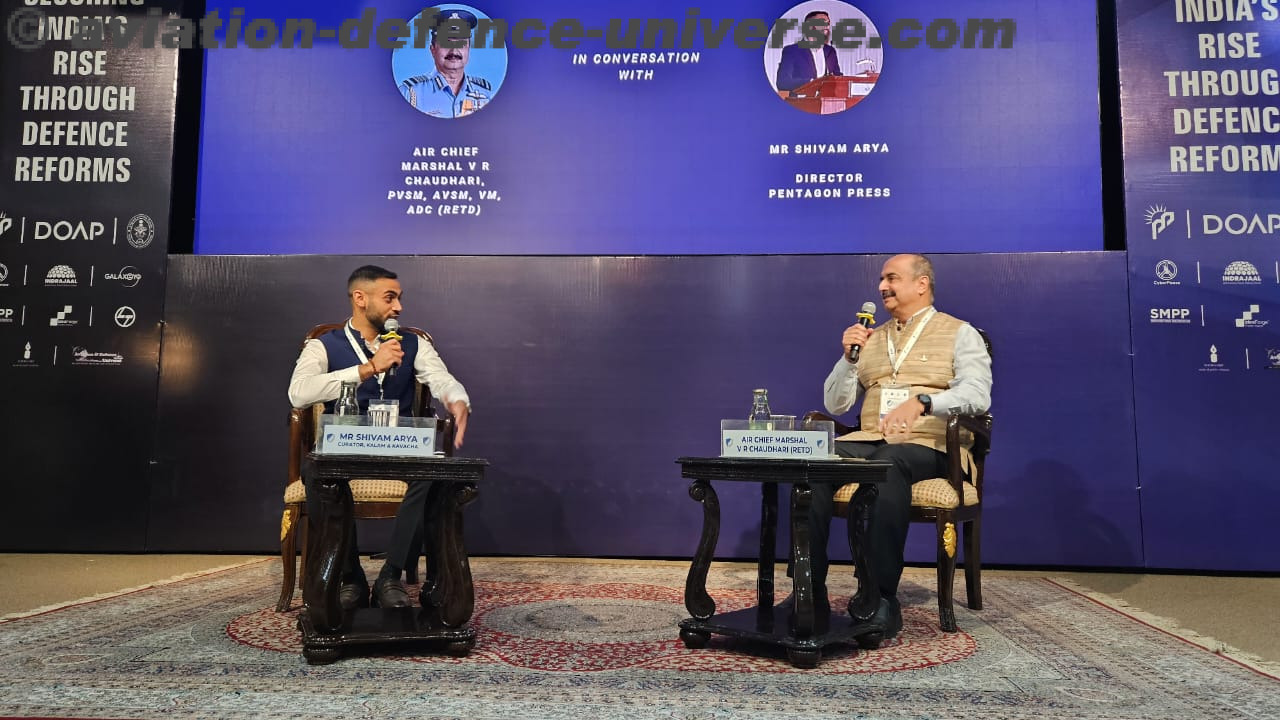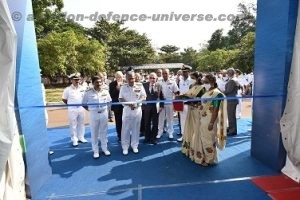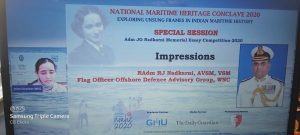
New Delhi. November 2020. The Maritime History Society conducted its first National Maritime Heritage Conclave on 18-19 Nov 2020 through the digital/virtual medium on the Theme: “Exploring Unsung Frames in Indian Maritime History” in collaboration with Gujarat Maritime University as the Academic Partner, The Daily Guardian as Media Partner and All India Marine Pilots Association as Professional Partner.
The Inaugural address delivered by Vice Admiral RB Pandit, Chief of Staff, Western Naval Command and Chairman MHS pointed out that the maritime history of India deserves the attention of both young and veteran scholars. Going deeper into the theme of the Conclave, he highlighted that the maritime medium remains a mystery due to our ignorance which can be overcome by digging deeper and exploring topics such as the unsung frames of the coastal communities and the contribution of women in the Indian maritime history. He reiterated the need to address a gap in our maritime history and heritage for which the eminent and young scholars must come together and be involved in a copious discourse.
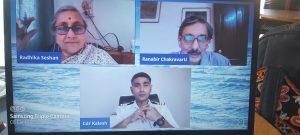
In his Thematic Address, Prof (Dr) S Shanthakumar, Director-in-charge of Gujarat Maritime University spoke about the sorry state of representation of women in maritime professions. He said, “In spite of advances in science and technology and in spite of Socio-cultural & economic developments happening globally, It is extremely disappointing to learn that Maritime sector have been uniquely affected by gender biases over the years.
The Keynote Address was delivered by Prof (Dr) Vasant Shinde, Director General, National Maritime Heritage Complex, Lothal. He delved into the Harappan civilization and the later period to talk about evidence of different phases of urbanization and their connection with the maritime identity of the nation.
The objectives of the conclave were to stimulate discussions on the under explored dimensions of Indian maritime history with a hope that the deliberations from various sessions would become starting points for further research in maritime history.
In addition to the Inaugural Session, Day One of the Conclave also had Thematic Session 1 on the theme of Coastal Communities. The session was moderated by Prof (Dr) Radhika Seshan and the eminent panellists that were a part of this session proceedings were Prof (Dr) Ranabir Chakravarti, Cdr (Dr) Kalesh Mohanan, Leora Pezarkar and in-house MHS Team scholars Dr Andre Baptista and Dennard H D’Souza. The Session spanned from outlining the role and nature of coastal communities, the nature of identity and the lifestyle of the coastal communities to elaborating on the need to work towards the inclusion of the local coastal communities in the matters pertaining to their heritage.
In tribute to the unsung craft and skill of boat builders and boatmen along the coast the conclave had a special audio-visual rendition. Titled, “Sagara” it integrated classic seafaring beauty in three elements. These were maritime emotion in writing, captivating voice of Riddhi Joshi and time-lapse doodle by Prathamesh Sawant into an amazing song!
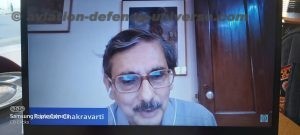
Day 02 of the Conclave began with Thematic Session-II based on the theme of Influence of Women in Indian Maritime History. The maritime medium does not discriminate based on gender or age. This session thus looked into the contribution of women in the maritime field. In house Research Associate Amruta Talawadekar and Adjunct Research Associate Poorvi Shriyan brought out the historical women figures in Indian Maritime history. In the session on women in the Indian maritime history, Lt Cdr Rajeshwari Kori, Reshma Nilofer and Sucheta Jadhav spoke about the experience of being at sea as women. The session constructively highlighted and envisaged on navigating the role of women in the maritime sector.
Thematic Session III was based on the theme of Trans-Maritime Connectivity in the Indian Ocean Region. This session saw three paper presentations in classic academic way. Cmde Ajay Agarwal, Cmde Sanjay D’Cunha, VSM and Ms Aishwarya Devasthali presented papers. The Session was moderated Prof (Dr) Lakshmi Subramanian.
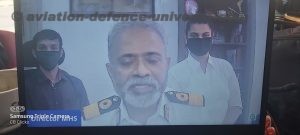
Steering away from traditional narratives is important to gain a holistic understanding of our past. And that is exactly what Maritime History Society set out to do with this National Maritime Heritage Conclave. Historical discourse on a niche topic as Maritime History will open up new interpretations and new learning in the way we have been looking at our history. For a better appreciation of the traditions, heritage and cultural practices of coastal communities and seafaring groups of India, it is important to know their history and develop the historiography that will aid in a better understanding of the communities.
The maritime domain is multidimensional. It has the onus of contributing trajectories for a wide connection with its ability for displacement of ships and boats, by the possibility of intermingling of people, as carrier of ideas and assimilator of culture.
These are the key takeaways from the programme that spanned two days but the substance of which has spanned millennia.












